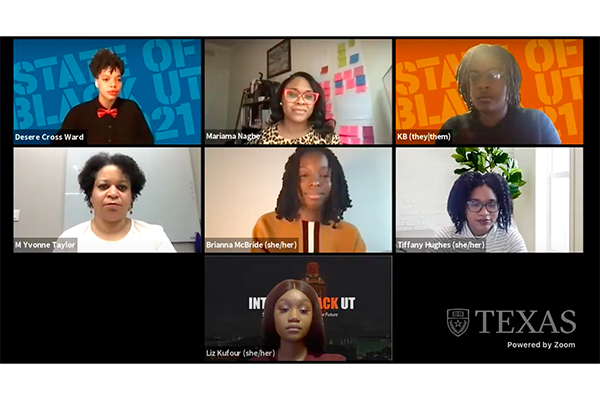Panelists and keynote speaker Peniel Joseph addressed action the UT community can take to make the University equitable and inclusive for Black students during the third day of State of Black UT.
Edmund Gordon, vice provost for diversity, said while the Black community at UT continues to push University administration for equity and inclusion policies, backlash continues.
Brianna McBride, co-director of the Black President's Leadership Council, said she and other UT students want to create a Black UT Senate that can come to administration as a united front for change on campus.
“Our goal is to gain a better understanding of all roles and perspectives to develop a more cohesive Black community on campus,” McBride said. “We envision this to be an experience where we can learn from one another and take into account the past, present and future state of Black well-being on the Forty Acres.”
KB Brookins, program coordinator for the Gender and Sexuality Center, spoke on behalf of the Black Queer and Trans Collective and said the intersectionality between sexuality and race also needs to be discussed.
“We need to start seeing queerness as a Black experience, and we have to start seeing Blackness as a queer experience when thinking of the State of Black UT," Brookins said.
Panelist Mariama Nagbe, educational leadership and policy graduate student, said the slogans and hashtags popularized during protests can undermine the value of the movement behind them.
“We raise these messages as a battle cry for you to see us, stand with us and do your part in our collective fight for justice and liberation,” Nagbe said. “But unfortunately, those messages aren't always treated as an open invitation for conversation and collective action. They're often seen as closed doors or dismissed as catchy phrases.”
Joseph, the founding director of the Center for the Study of Race and Democracy at the LBJ School, said during his keynote address for State of Black UT that systemic racism is present in Austin as well as the University, and it needs to be addressed.
“We live in a country where Black life does not matter because it happens to Black people,” Joseph said. “The context of white supremacy and the racial caste system that has been set up in the United States … to marginalize, punish and murder Black people in perpetuity.”
Joseph said the racial inequalities at UT are an example of continual white supremacy in the United States.
“We know the racially disparate outcomes we see right here in Austin, right here at the University of Texas, are because of the deep and ongoing history of anti-Black racism and white supremacy that this country breathes like oxygen every single day,” Joseph said.
He said the continued use of confederate flags and memorabilia as well as the disproportionate effect of COVID-19 on Black communities further demonstrate the racial inequality within the U.S.
“Black people have been the most desecrated, despised, killed and murdered people in this country historically,” Joseph said. “It’s anti-Blackness that is the organizing principle of America's racial caste system — a caste system that still flourishes today in the United States, in Austin, in The University of Texas, in perpetuity.”
According to a study done by Yale University from October, Black Americans were killed in police shootings at 2.6 times the rate of white people in the past 5 years.
Younger generations have a responsibility to use their knowledge to educate others, make change and destroy the status quo of white supremacy that exists in society, Joseph said.
“There are not enough hashtags in the world to provide the reparations that are necessary for this moment,” Joseph said. “It’s not just about allyship. What we need is actual solidarity, not just politically but personally and morally.”





















